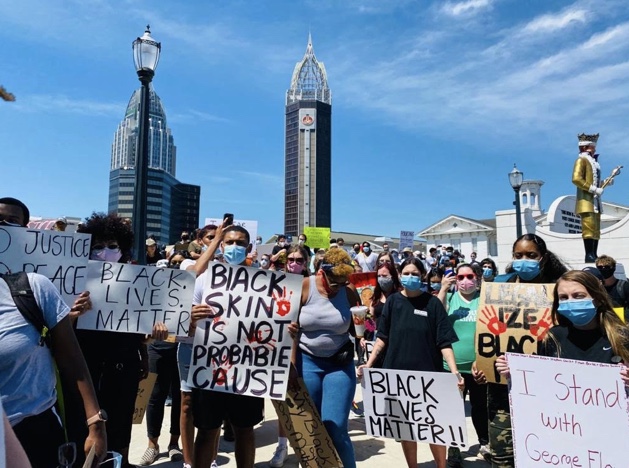Protesting in a Pandemic
October 19, 2020
If someone had informed me that I would be protesting in Bienville Square over the death of countless unarmed black men and women during a global pandemic, I may have laughed. As I reflect on the numerous deaths of unarmed black men and women this year alone, the reality of where we stand as black people becomes harder to bear. It is no longer acceptable for us to hide behind our ancestors’ actions because the truth is that despite their contributions, we are stuck in this nostalgic state that somehow, somewhere, a Martin Luther King Jr. figure will rise and lead us to victory.
However, that did not stop me. Being around hundreds of people walking around holding signs and yelling out our representatives’ demands in the middle of the day gave me a bit of anxiousness. As much as I wished most of that anxiousness came from fear of catching COVID-19, it did not. I realized as I prepared to go downtown that my biggest fear was a police presence. After hearing about the tear-gassing of protesters by the police and other local government officials’ brutal responses, I feared that what began as a peaceful protest on this beautiful Sunday afternoon could end in tragedy.
But, despite that fear, I still decided to go because it was at that moment I knew that this was a cause I would give my life for, and at the time, I believed that I was surrounding myself with people who felt the same way. Unfortunately, despite the commutative passion of the crowd, I quickly realized why many protests fail. Everyone was there for different reasons, many of which did not coincide with my reasons.
For example, while walking and chanting, my friends and I realized that most of them were only chanting George Floyd’s name. Since the media has made him a martyr of this social justice movement, he was not the first black man to die at the hands of the police on camera; if anything, he was just the latest in a long list of people. Immediately after the third time of them only chanting his name, my friends and I realized that people such as Breonna Taylor, Sandra Bland, Michael Brown, Tamir Rice, and many more were not acknowledged although we were here for all of them. So, we took it upon ourselves to change the narrative and chant different names each time, which, for the most part, worked. We were able to spread the message across the crowd and get them to chant more names.
Once we covered enough ground downtown, we met in a central area to allow protesters to kneel in demonstration and speak individually about why we were all here. One woman said that she came to protest today in fear that her disabled son could become a victim of police brutality at the drop of a dime and that she felt helpless. I remember her saying she always fears he won’t make it back to her. Another protester stood up and decided to chant “all lives matter” with a black lives matter sign in hand. On top of him chanting all lives matter, he made a point of thanking the white people for coming out and standing in solidarity with us.
Outside of the shock on our faces that a black man would stand up and chant all lives matter, his appreciation of the white people for joining us did not sit right with me. It honestly made me mad because I could not fathom how someone could so easily miss the mark. However, despite our shock, we chose to try and talk to the man and see why he would start a chant saying all lives matter when that discredits the work we are doing here. He disagreed with our sentiments; he believed he was friendly and acknowledging that all of the lives here mattered, which they do, but that is not why we were there.
We were there to stand in solidarity with our community’s lives at the hands of police brutality as it has become the most commonly used method to let us know that our lives do not have meaning to them. More importantly, we should not, in any way, thank a group of people for doing what they are expected to do. People should not have to be thanked nor rewarded for caring about a genocide happening in front of their eyes because, despite them standing in solidarity, they do not feel the pain that we do. They cannot connect because when we see a Breonna Taylor or a George Floyd, we see them as our family, which means losing them is like losing a family member.
As demonstrations continue to happen across the country, I hope that those onlookers realize we are not merely protesting another black man or woman’s death. We are protesting our genocide and mourning the death of a member of our community. We are protesting for our lives. Social justice reform is a matter of life or death and should be treated as such for each person who decides to protest.







